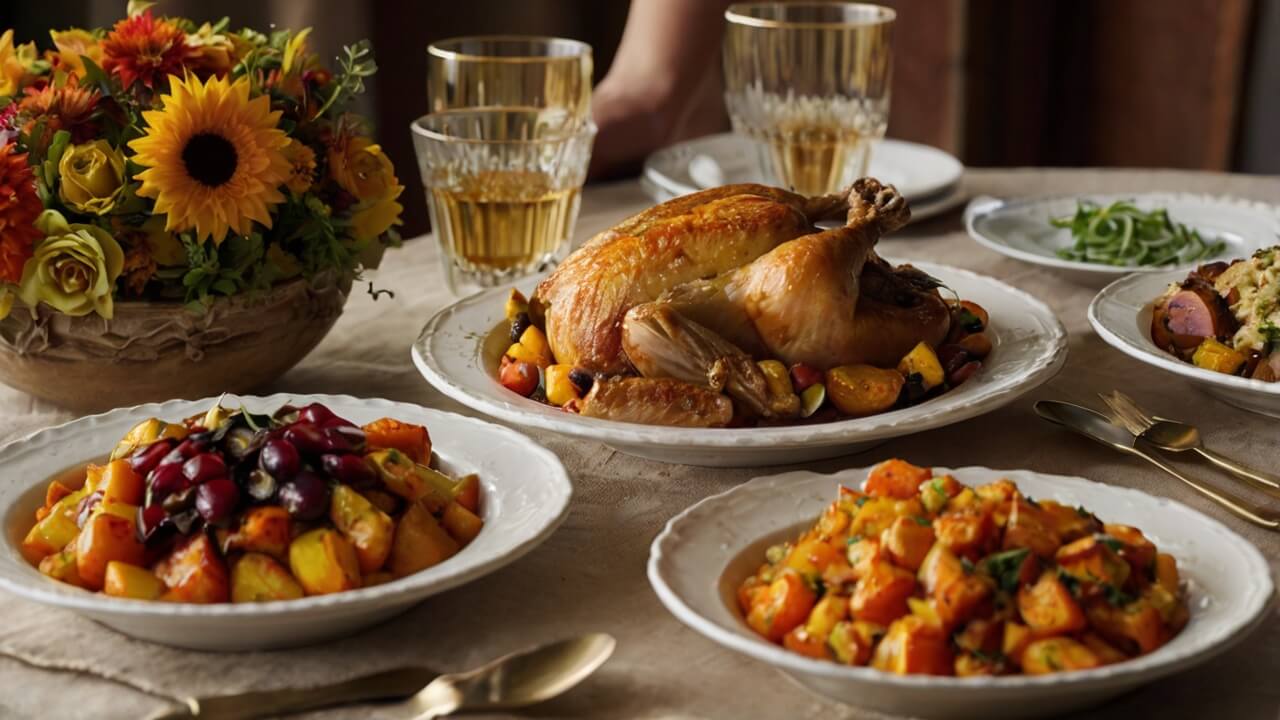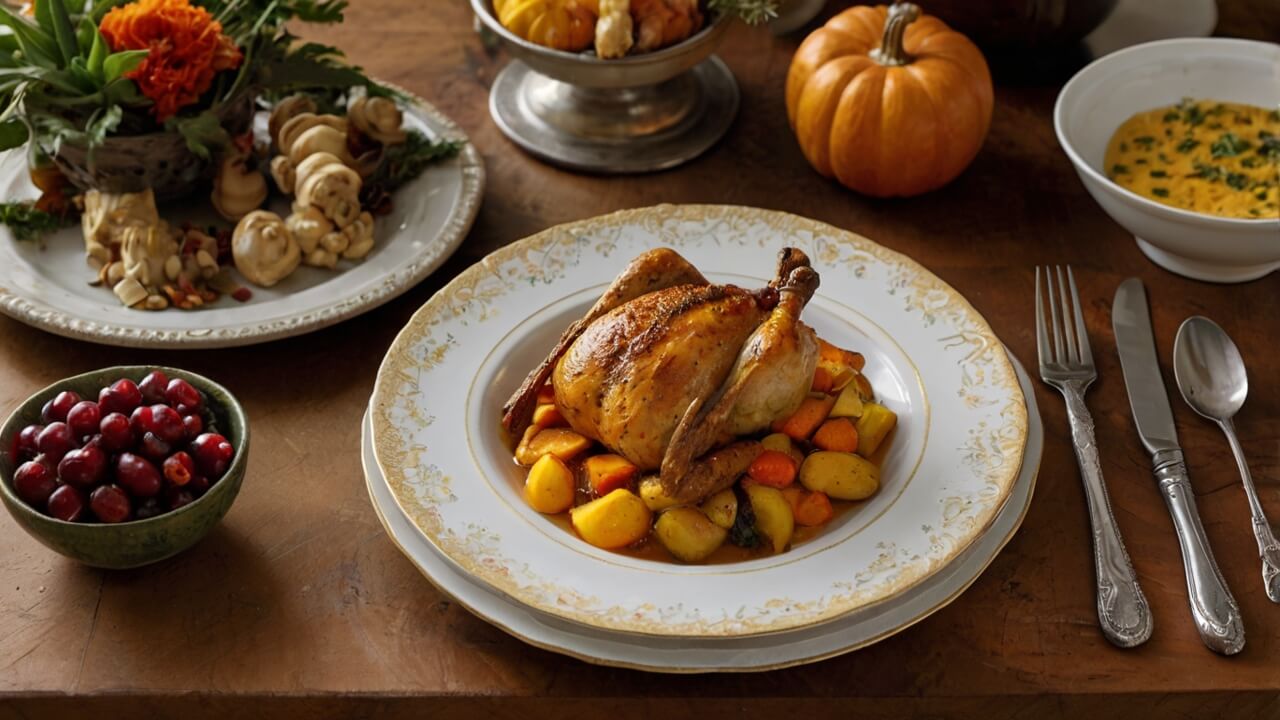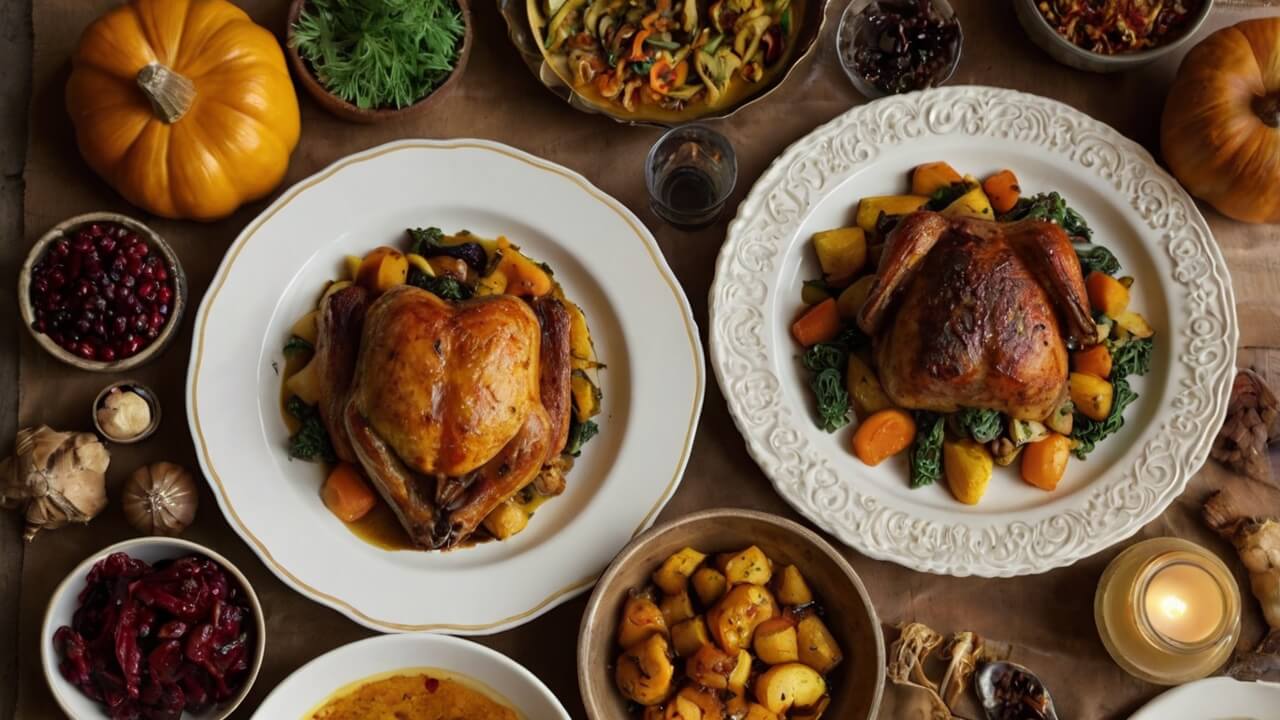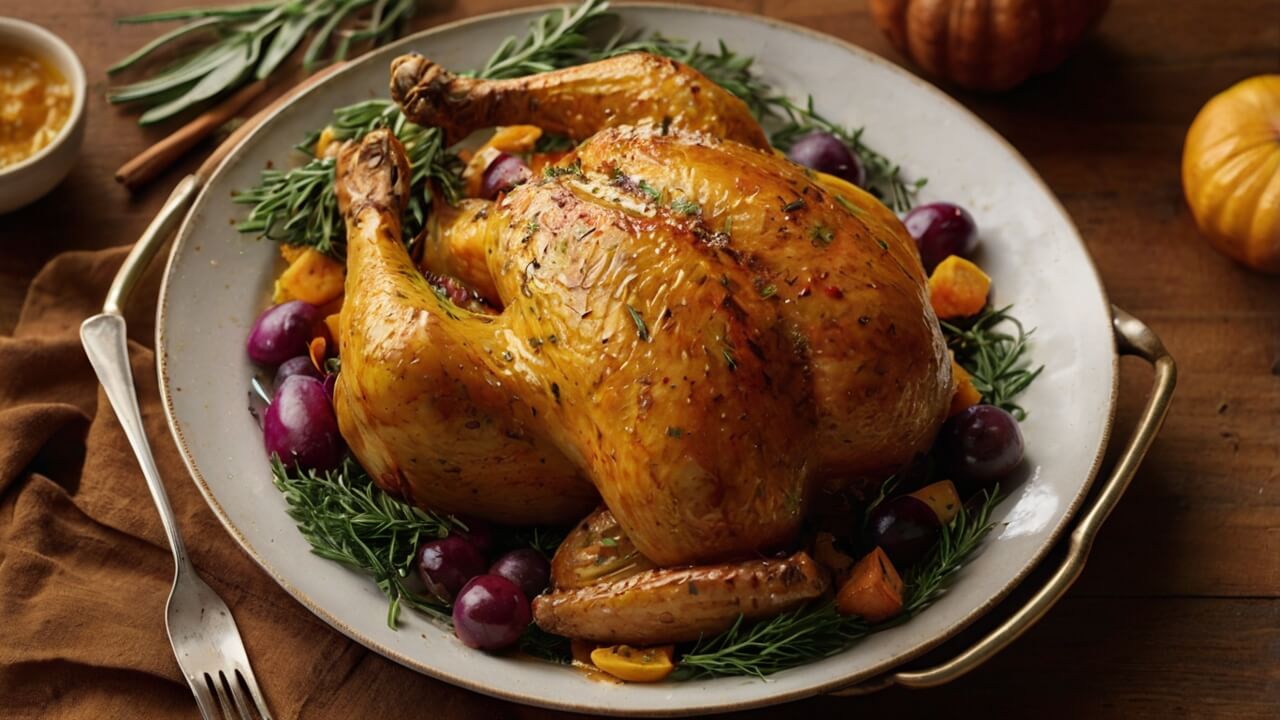Inflammation is a natural response of the body’s immune system to protect against harmful stimuli like pathogens, damaged cells, or irritants.
However, chronic inflammation can lead to various health issues, including autoimmune disorders, heart disease, cancer, and Alzheimer’s disease.
An anti-inflammatory diet focuses on consuming foods that reduce inflammation and avoiding those that promote it.
Following an anti-inflammatory diet can provide numerous benefits, such as improved digestion, reduced risk of chronic diseases, better cognitive function, and enhanced overall well-being.
By incorporating anti-inflammatory ingredients into your Thanksgiving meal, you can enjoy the traditional flavors while supporting your body’s health.
While classic Thanksgiving dishes like roasted turkey, mashed potatoes, and pumpkin pie are delicious, they often contain ingredients that can contribute to inflammation, such as saturated fats, refined carbohydrates, and processed sugars.
However, with a few simple modifications, you can transform these beloved dishes into anti-inflammatory masterpieces.
Anti-Inflammatory Appetizers

Kick off your anti-inflammatory Thanksgiving feast with a vibrant selection of appetizers that tantalize your taste buds while nourishing your body.
Start with a warm and comforting Turmeric Cauliflower Soup with Ginger and Black Pepper. This golden elixir is brimming with potent anti-inflammatory compounds that work in synergy to combat inflammation.
Turmeric, the star ingredient, is a powerful antioxidant and anti-inflammatory agent thanks to its active compound, curcumin.
Numerous studies have shown turmeric’s ability to reduce inflammation markers in the body. Ginger, another superfood in this soup, contains gingerol, a bioactive compound that has been proven to alleviate inflammation and ease muscle soreness.
And let’s not forget black pepper, which enhances the bioavailability of curcumin, allowing your body to absorb and utilize its benefits more effectively.
For a refreshing and crunchy option, prepare a Raw Veggie Platter with Hummus or Guacamole Dip. Loading up on fresh, nutrient-dense vegetables is a fantastic way to flood your body with antioxidants, fiber, and anti-inflammatory phytochemicals.
Pair your vibrant veggie medley with a creamy hummus or guacamole dip, both of which offer their own anti-inflammatory advantages.
Hummus, made from chickpeas, is rich in fiber, protein, and healthy fats, all of which can help reduce inflammation.
Guacamole, on the other hand, derives its anti-inflammatory prowess from avocados, which are packed with monounsaturated fats, vitamin E, and carotenoids like lutein and zeaxanthin.
By incorporating these delicious and nutritious appetizers into your Thanksgiving spread, you’re not only whetting your appetite but also setting the stage for a truly anti-inflammatory feast that will leave you feeling energized and nourished from the inside out.
The Main Event: Anti-Inflammatory Turkeys and Alternatives

For many, the centerpiece of the Thanksgiving meal is the turkey. Fortunately, with a few simple tweaks, this holiday staple can be transformed into an anti-inflammatory delight.
Our Herb-Roasted Turkey recipe infuses the bird with a fragrant blend of rosemary, thyme, and sage – spices renowned for their anti-inflammatory properties.
These aromatic herbs not only impart a delicious flavor but also provide a potent dose of antioxidants and anti-inflammatory compounds.
But what about those following a plant-based diet? Fear not, as we’ve got you covered with two mouthwatering alternatives: a savory Tofurky and a hearty Lentil Loaf.
Both options are packed with plant-based protein and fiber, making them satisfying and nourishing choices.
The Tofurky, a blend of wheat protein and tofu, is seasoned to perfection with a proprietary blend of spices and herbs. Its texture and flavor mimic that of traditional turkey, ensuring that no one misses out on the classic Thanksgiving experience.
For those seeking a gluten-free option, our Lentil Loaf is sure to delight. Made with a medley of lentils, vegetables, and aromatic spices, this loaf is not only delicious but also loaded with fiber, protein, and anti-inflammatory compounds from the lentils and spices.
No matter which main dish you choose, you can rest assured that your Thanksgiving meal will be a celebration of flavor and nourishment, without compromising your commitment to an anti-inflammatory lifestyle.
Nourishing Anti-Inflammatory Side Dishes

Mashed cauliflower is a delightfully creamy and low-carb alternative to traditional mashed potatoes. Simply steam cauliflower florets until tender, then blend or mash them with a touch of olive oil, garlic, and your favorite herbs or dairy-free milk for a rich, velvety texture. This dish is not only anti-inflammatory but also packed with fiber, vitamins, and antioxidants.
Roasted sweet potatoes are a Thanksgiving staple that can be easily transformed into an anti-inflammatory delight. Toss cubed sweet potatoes with olive oil, fresh rosemary, and a sprinkle of salt and pepper, then roast until tender and caramelized. Sweet potatoes are an excellent source of beta-carotene, which has powerful anti-inflammatory properties, while rosemary adds a fragrant and flavorful boost.
For a hearty and nutritious stuffing, try a quinoa-based version with tart cranberries and roasted acorn squash. Cook quinoa according to package instructions, then mix it with sautéed onions, celery, cranberries, and cubed acorn squash. Season with sage, thyme, and a drizzle of olive oil for a delicious and anti-inflammatory twist on a classic side dish. Quinoa is a gluten-free grain rich in fiber and protein, while cranberries and squash provide antioxidants and vitamins.
Sautéed green beans are a simple yet flavorful addition to your anti-inflammatory Thanksgiving spread. Trim and halve fresh green beans, then sauté them in olive oil with minced garlic until tender-crisp. Garlic is a potent anti-inflammatory ingredient, and olive oil provides heart-healthy fats. Top with a squeeze of lemon juice or a sprinkle of toasted almonds for added flavor and nutrition.
Roasted Brussels sprouts are a fan favorite that can be easily adapted for an anti-inflammatory diet. Toss trimmed and halved Brussels sprouts with olive oil, salt, and pepper, then roast until crispy and caramelized. For an extra touch of sweetness and anti-inflammatory benefits, drizzle with a bit of pure maple syrup before serving. Brussels sprouts are rich in fiber, vitamins, and antioxidants, making them a nutritious and delicious side dish choice.
Flavorful Anti-Inflammatory Sauces and Condiments
No Thanksgiving feast is complete without delicious sauces and condiments to complement the main dishes and sides. Fortunately, there are plenty of flavorful options that also pack an anti-inflammatory punch.
Fig and Pomegranate Sauce
This vibrant sauce is a perfect addition to your anti-inflammatory Thanksgiving spread. Figs are rich in antioxidants like vitamin C, vitamin K, and potassium, which can help reduce inflammation in the body. Pomegranates are another powerhouse of anti-inflammatory compounds, including punicalagins and anthocyanins.
Ingredients:
- 1 cup fresh figs, stemmed and quartered
- 1 cup pomegranate seeds
- 1/2 cup orange juice
- 2 tablespoons balsamic vinegar
- 1 tablespoon honey
- 1 teaspoon ground cinnamon
- 1/4 teaspoon ground ginger
- Salt and pepper to taste
Instructions:
- In a saucepan, combine the figs, pomegranate seeds, orange juice, balsamic vinegar, honey, cinnamon, and ginger.
- Bring the mixture to a simmer over medium heat, stirring occasionally.
- Cook for 10-15 minutes, or until the figs have softened and the sauce has thickened slightly.
- Remove from heat and use an immersion blender or regular blender to blend the sauce until smooth.
- Season with salt and pepper to taste.
Drizzle this vibrant and tangy sauce over your turkey or use it as a dipping sauce for roasted vegetables or crackers.
Vegan Mushroom Gravy
Mushrooms are a fantastic source of anti-inflammatory compounds like selenium, vitamin D, and antioxidants like ergothioneine. This rich and savory gravy is a delicious plant-based alternative to traditional gravies.
Ingredients:
- 1 pound mushrooms (a mix of cremini, shiitake, and oyster mushrooms works well)
- 4 tablespoons olive oil
- 1 large onion, diced
- 4 cloves garlic, minced
- 1/4 cup dry white wine (or vegetable broth)
- 3 tablespoons all-purpose flour (or gluten-free flour blend)
- 2 cups vegetable broth
- 2 tablespoons tamari or soy sauce
- 1 teaspoon dried thyme
- Salt and pepper to taste
Instructions:
- Clean and slice the mushrooms.
- In a large skillet, heat 2 tablespoons of olive oil over medium-high heat.
- Add the sliced mushrooms and sauté for 5-7 minutes, or until they release their liquid and begin to brown.
- Remove the mushrooms from the skillet and set aside.
- In the same skillet, heat the remaining 2 tablespoons of olive oil over medium heat.
- Add the diced onion and sauté for 2-3 minutes, or until translucent.
- Add the minced garlic and cook for another minute, stirring frequently.
- Deglaze the pan with the white wine (or vegetable broth), scraping up any browned bits from the bottom.
- Sprinkle the flour over the onion mixture and stir to create a roux. Cook for 1-2 minutes.
- Gradually whisk in the vegetable broth, tamari/soy sauce, and dried thyme.
- Add the sautéed mushrooms back to the skillet and bring the mixture to a simmer.
- Cook for 5-7 minutes, or until the gravy has thickened to your desired consistency.
- Season with salt and pepper to taste.
Serve this rich and savory gravy over your anti-inflammatory Tofurky or lentil loaf, or use it as a dipping sauce for roasted vegetables or mashed cauliflower.
Guilt-Free Anti-Inflammatory Desserts
After a nourishing anti-inflammatory Thanksgiving meal, you can indulge in delectable desserts that are equally kind to your body. Say goodbye to sugar-laden pies and cakes that can trigger inflammation and hello to naturally sweet treats that delight your taste buds while promoting overall wellness.
Raw Pumpkin Pie with Almond-Date Crust
This raw pumpkin pie is a true gem, boasting a velvety pumpkin filling nestled in a crust made from nutrient-dense almonds and dates. Almonds are an excellent source of vitamin E, a powerful antioxidant that helps combat inflammation. Dates, on the other hand, provide a natural sweetness while offering fiber, potassium, and anti-inflammatory compounds.
Pumpkin Filling:
- Pumpkin puree: Rich in vitamin A, which has anti-inflammatory properties.
- Coconut milk: Provides healthy fats and lauric acid, known for its anti-inflammatory effects.
- Maple syrup: A natural sweetener with anti-inflammatory properties.
- Pumpkin spice: A blend of cinnamon, ginger, and nutmeg, all of which have anti-inflammatory benefits.
Almond-Date Crust:
- Almonds: Packed with vitamin E, healthy fats, and antioxidants that reduce inflammation.
- Dates: Offer natural sweetness and fiber, promoting a healthy gut and reducing inflammation.
Baked Cinnamon Apples
Warm and comforting, these baked cinnamon apples are a delightful way to end your Thanksgiving feast. Apples are rich in antioxidants and fiber, while cinnamon is a true anti-inflammatory powerhouse.
Cinnamon: This fragrant spice is loaded with anti-inflammatory compounds, including cinnamaldehyde and polyphenols. It has been shown to help regulate blood sugar levels and reduce inflammation in the body.
Apples: High in fiber and antioxidants like quercetin, apples can help lower inflammation markers and promote a healthy gut.
Honey or Maple Syrup: Instead of refined sugar, these natural sweeteners provide a touch of sweetness without spiking inflammation.
By incorporating these guilt-free desserts into your Thanksgiving celebration, you can indulge in delicious treats while nourishing your body with anti-inflammatory ingredients. Embrace the flavors of the season while prioritizing your overall well-being.
Key Anti-Inflammatory Ingredient Swaps
Adopting an anti-inflammatory diet doesn’t mean sacrificing flavor or tradition. By making a few simple ingredient swaps, you can transform classic Thanksgiving dishes into nourishing, inflammation-fighting meals. Here are some key substitutions to keep in mind:
Use Olive Oil Instead of Butter: Extra virgin olive oil is a powerhouse of anti-inflammatory compounds, including oleocanthal, which has been shown to have similar effects as ibuprofen. Swap out butter for olive oil in recipes like mashed potatoes, stuffing, and roasted vegetables for a healthier alternative that doesn’t compromise taste.
Replace Refined Sugar with Maple Syrup or Honey: Refined sugars can contribute to inflammation and a host of other health issues. Instead, opt for natural sweeteners like maple syrup or honey, which are packed with antioxidants and have a lower glycemic index, meaning they won’t spike your blood sugar as dramatically.
Swap Dairy Milk for Almond or Coconut Milk: Dairy products can be inflammatory for some individuals, particularly those with sensitivities or intolerances. Plant-based milks like almond or coconut milk offer a creamy, dairy-free alternative that can be used in recipes for mashed potatoes, pumpkin pie, and more.
Use Gluten-Free Flours and Grains: Gluten, a protein found in wheat, barley, and rye, can trigger inflammation in those with celiac disease or gluten sensitivity. To make your Thanksgiving dishes gluten-free, swap out regular flour for gluten-free alternatives like almond flour, coconut flour, or gluten-free oat flour.
Incorporate Anti-Inflammatory Spices: Certain spices and herbs are packed with anti-inflammatory compounds that can add depth of flavor while promoting overall health. Sprinkle your dishes with turmeric, ginger, cinnamon, rosemary, thyme, and sage for a delicious and inflammation-fighting punch.
By making these simple swaps, you can enjoy all the flavors of Thanksgiving without compromising your commitment to an anti-inflammatory lifestyle.
The Science Behind an Anti-Inflammatory Diet
Inflammation is a natural response of the body’s immune system to protect against injury, infection, or illness. However, chronic inflammation can lead to various health issues, including autoimmune disorders, heart disease, cancer, and neurodegenerative conditions like Alzheimer’s disease. This persistent state of inflammation is often fueled by an unhealthy diet rich in processed foods, refined carbohydrates, unhealthy fats, and additives.
On the other hand, an anti-inflammatory diet focuses on consuming whole, nutrient-dense foods that can help reduce and prevent chronic inflammation. This dietary pattern is rich in antioxidants, healthy fats, and phytochemicals that have potent anti-inflammatory properties. By following an anti-inflammatory diet, you can support your body’s natural healing processes and potentially reduce your risk of developing chronic diseases.
Dietary Components That Combat Inflammation
- Omega-3 Fatty Acids: Found in fatty fish, walnuts, and flaxseeds, omega-3s have been shown to reduce inflammation and promote brain health.
- Antioxidants: Colorful fruits and vegetables, such as berries, leafy greens, and tomatoes, are rich in antioxidants that neutralize harmful free radicals and reduce inflammation.
- Fiber: Whole grains, legumes, and fruits provide fiber, which supports a healthy gut microbiome and reduces inflammation in the digestive system.
- Spices and Herbs: Turmeric, ginger, rosemary, and other herbs and spices contain potent anti-inflammatory compounds like curcumin and gingerol.
By incorporating these nutrient-dense, anti-inflammatory foods into your Thanksgiving meal, you can enjoy the flavors of the holiday while nourishing your body and potentially reducing the risk of chronic diseases associated with inflammation.
Expert Tips for an Anti-Inflammatory Thanksgiving
Dr. Maria Garcia, Registered Dietitian: “Thanksgiving is a time for indulgence, but with a few simple swaps, you can enjoy all the traditional flavors while reducing inflammation. I recommend focusing on colorful fruits and vegetables, healthy fats like olive oil and avocado, and lean proteins. Spices like turmeric, ginger, and cinnamon are also excellent anti-inflammatory additions to your dishes.”
Dr. Michael Lee, Naturopathic Doctor: “Chronic inflammation is at the root of many health issues, so an anti-inflammatory diet is crucial. For Thanksgiving, I advise my patients to limit processed foods, refined carbs, and sugary desserts. Instead, opt for nutrient-dense whole foods like sweet potatoes, Brussels sprouts, and quinoa. And don’t forget to stay hydrated!”
Sarah Thompson, Certified Nutritionist: “One of the easiest ways to make your Thanksgiving meal more anti-inflammatory is to use herbs and spices liberally. Rosemary, thyme, and sage are not only flavorful but also packed with anti-inflammatory compounds. You can also try making a cranberry sauce with fresh cranberries, which are rich in antioxidants.”
Dr. David Kim, Integrative Medicine Specialist: “Stress can contribute to inflammation, so it’s essential to create a relaxing atmosphere during your Thanksgiving celebration. Light some candles, play soothing music, and encourage mindful eating. Also, consider incorporating fermented foods like sauerkraut or kombucha into your meal, as they support a healthy gut microbiome.”
Jessica Rodriguez, Holistic Health Coach: “Don’t forget about portion control! Even with anti-inflammatory ingredients, overeating can still lead to inflammation. I recommend filling half your plate with vegetables, a quarter with lean protein, and a quarter with healthy carbs like sweet potatoes or quinoa. And make sure to savor each bite and listen to your body’s hunger and fullness cues.”
Personal Stories and Testimonials
Sarah, 35, Chronic Migraines: “I used to dread Thanksgiving because the heavy, rich foods would often trigger a debilitating migraine that would ruin the entire holiday for me. Last year, I decided to try an anti-inflammatory Thanksgiving menu, and it made all the difference. I was able to enjoy the delicious flavors without any of the pain or discomfort. The turmeric cauliflower soup and roasted Brussels sprouts were standout dishes for me.”
Mike, 42, Rheumatoid Arthritis: “Living with rheumatoid arthritis, I’m always looking for ways to reduce inflammation in my body. These anti-inflammatory Thanksgiving recipes were a game-changer. The herb-roasted turkey was incredibly flavorful, and the quinoa stuffing with cranberries and acorn squash was a delightful twist on a classic. I didn’t feel weighed down or experience any joint flare-ups after the meal.”
Emily, 28, Vegan: “As a vegan, I was thrilled to find so many delicious plant-based options in this anti-inflammatory Thanksgiving menu. The lentil loaf was hearty and satisfying, and the raw pumpkin pie with an almond-date crust was a revelation. I felt energized and nourished after the meal, and my non-vegan family members couldn’t get enough of the dishes either.”
Tom, 51, Chronic Inflammation: “I’ve been following an anti-inflammatory diet for a few years now, and it has made a world of difference in managing my chronic inflammation. These Thanksgiving recipes were a welcome addition to my repertoire. The sautéed green beans with garlic and olive oil were a simple yet flavorful side, and the fig and pomegranate sauce added a beautiful pop of color and flavor to the plate.”
Conclusion
Embracing an anti-inflammatory Thanksgiving is a delicious and nourishing way to celebrate the holiday season while prioritizing your health.
By incorporating the recipes and tips outlined in this guide, you can indulge in traditional flavors while benefiting from the powerful anti-inflammatory properties of ingredients like turmeric, ginger, olive oil, and antioxidant-rich fruits and vegetables.
The beauty of these recipes lies in their ability to reduce inflammation, a underlying factor in many chronic conditions, while still delivering the comforting tastes and aromas we associate with Thanksgiving.
From the herb-roasted turkey to the mashed cauliflower “potatoes,” and the raw pumpkin pie with an almond-date crust, each dish is a testament to the fact that healthy eating can be both delicious and satisfying.
We encourage you to try these recipes and experience the joy of a nourishing and inflammation-friendly Thanksgiving meal.
Share your experiences and creations with us in the comments section, and let us know which dishes were your favorites. Remember, small changes can have a significant impact on your overall well-being.
Don’t stop here! Subscribe to our newsletter to receive more anti-inflammatory recipe ideas, nutrition tips, and expert insights.
Together, we can embark on a journey towards better health, one delectable meal at a time. Wishing you a happy, healthy, and inflammation-free Thanksgiving!

